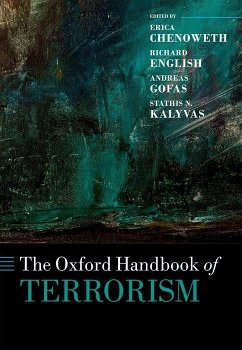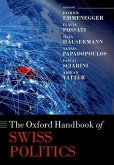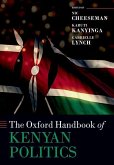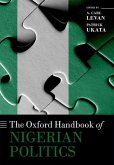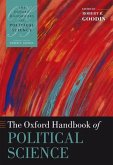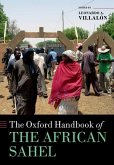Oxford Handbook of Terrorism
Herausgeber: Chenoweth, Erica; Gofas, Andreas; English, Richard
Oxford Handbook of Terrorism
Herausgeber: Chenoweth, Erica; Gofas, Andreas; English, Richard
- Gebundenes Buch
- Merkliste
- Auf die Merkliste
- Bewerten Bewerten
- Teilen
- Produkt teilen
- Produkterinnerung
- Produkterinnerung
This Handbook reviews the state of the art approaches and issues in researching and teaching about terrorism and counterterrorism.
Andere Kunden interessierten sich auch für
![The Oxford Handbook of Swiss Politics The Oxford Handbook of Swiss Politics]() The Oxford Handbook of Swiss Politics208,99 €
The Oxford Handbook of Swiss Politics208,99 €![The Oxford Handbook of Kenyan Politics The Oxford Handbook of Kenyan Politics]() The Oxford Handbook of Kenyan Politics65,99 €
The Oxford Handbook of Kenyan Politics65,99 €![Oxford Handbook of Nigerian Politics Oxford Handbook of Nigerian Politics]() Oxford Handbook of Nigerian Politics239,99 €
Oxford Handbook of Nigerian Politics239,99 €![The Oxford Handbook of Political Science The Oxford Handbook of Political Science]() The Oxford Handbook of Political Science82,99 €
The Oxford Handbook of Political Science82,99 €![The Oxford Handbook of the African Sahel The Oxford Handbook of the African Sahel]() The Oxford Handbook of the African Sahel263,99 €
The Oxford Handbook of the African Sahel263,99 €![The Oxford Handbook of German Politics The Oxford Handbook of German Politics]() The Oxford Handbook of German Politics212,99 €
The Oxford Handbook of German Politics212,99 €![The Oxford Handbook of Digital Diplomacy The Oxford Handbook of Digital Diplomacy]() Corneliu BjolaThe Oxford Handbook of Digital Diplomacy202,99 €
Corneliu BjolaThe Oxford Handbook of Digital Diplomacy202,99 €-
-
-
This Handbook reviews the state of the art approaches and issues in researching and teaching about terrorism and counterterrorism.
Hinweis: Dieser Artikel kann nur an eine deutsche Lieferadresse ausgeliefert werden.
Hinweis: Dieser Artikel kann nur an eine deutsche Lieferadresse ausgeliefert werden.
Produktdetails
- Produktdetails
- Oxford Handbooks
- Verlag: Oxford University Press
- Seitenzahl: 824
- Erscheinungstermin: 14. Mai 2019
- Englisch
- Abmessung: 254mm x 177mm x 58mm
- Gewicht: 1602g
- ISBN-13: 9780198732914
- ISBN-10: 0198732910
- Artikelnr.: 55395867
- Herstellerkennzeichnung
- Libri GmbH
- Europaallee 1
- 36244 Bad Hersfeld
- gpsr@libri.de
- Oxford Handbooks
- Verlag: Oxford University Press
- Seitenzahl: 824
- Erscheinungstermin: 14. Mai 2019
- Englisch
- Abmessung: 254mm x 177mm x 58mm
- Gewicht: 1602g
- ISBN-13: 9780198732914
- ISBN-10: 0198732910
- Artikelnr.: 55395867
- Herstellerkennzeichnung
- Libri GmbH
- Europaallee 1
- 36244 Bad Hersfeld
- gpsr@libri.de
Erica Chenoweth is a Professor of Public Policy at the Harvard Kennedy School and, beginning in 2019, the Susan S. and Kenneth L. Wallach Professor at the Radcliffe Institute for Advanced Study, Harvard University. Foreign Policy magazine ranked her among the Top 100 Global Thinkers of 2013 for her work to advance the empirical study of civil resistance. Her book, Why Civil Resistance Works (Columbia University Press, 2011) with Maria J. Stephan, also won the 2013 Grawemeyer Award for Ideas Improving World Order. Chenoweth has authored or edited five books and dozens of articles on political violence and its alternatives. She earned a PhD and an MA from the University of Colorado and a BA from the University of Dayton. Richard English is Professor of Politics at Queen's University Belfast, where he is also Distinguished Professorial Fellow in the Senator George J. Mitchell Institute for Global Peace, Security, and Justice. He is the author of eight books, including the award-winning studies Armed Struggle: The History of the IRA (2003) and Irish Freedom: The History of Nationalism in Ireland (2006). He is a Fellow of the British Academy, a Member of the Royal Irish Academy, a Fellow of the Royal Society of Edinburgh, a Fellow of the Royal Historical Society, an Honorary Fellow of Keble College Oxford, and an Honorary Professor at the University of St Andrews. Andreas Gofas is Associate Professor of International Relations at Panteion University of Athens and director of the Center for the Analysis of Terrorism and European Security (CATES) at the European Law and Governance School. His publication include The Sage Handbook of the History, Philosophy, and Sociology of International Relations (co-edited with Inanna Hamati-Ataya and Nicholas Onuf, Sage, 2018), and The Role of Ideas in Political Analysis (co-edited wtih Colin Hay, Routledge, 2012). Stathis N. Kalyvas is the Gladstone Professor of Government at the Department of Politics and International Relations at the University of Oxford and a fellow of All Souls College. Prior to his appointment at Oxford, he was the Arnold Wolfers Professor of Political Science at Yale University, where he also founded and headed the Program on Order, Conflict and Violence. His publications include Modern Greece: What Everyone Needs to Know (OUP, 2015), and The Logic of Violence in Civil War (CUP, 2006).
* Introduction
* 1: Erica Chenoweth and Andreas Gofas: The Study of Terrorism:
Achievements and Challenges Ahead
* Part One: Concepts and Typologies
* 2: Stathis Kalyvas: The Landscape of Political Violence
* 3: Ben Saul: Defining Terrorism: A Conceptual Minefield
* 4: Gary LaFree: The Evolution of Terrorism Event Databases
* 5: Virginia Held: The Moral Dimensions of Terrorism
* Part Two: The History of Terrorist Violence
* 6: Warren C. Brown: The Pre-History of Terrorism
* 7: Martin A. Miller: European Political Violence During the Long 19th
Century
* 8: John Bew, Alexander Meleagrou-Hitchens, and Martyn Frampton: The
Long 20th Century
* Part Three: Approaches and Methods
* 9: Lorenzo Bosi, Donatella della Porta, and Stefan Malthaner:
Organizational and Institutional Approaches: Social Movement Studies
Perspectives on Political Violence
* 10: Jacob N. Shapiro: Formal Approaches to the Study of Terrorism
* 11: Daren G. Fisher and Laura Dugan: Sociological and Criminological
Explanations of Terrorism
* 12: Sinia Maleevi¿: Anthropological and Cultural Approaches to the
Study of Terrorism
* 13: Brenda J. Lutz: Historical Approaches to Terrorism
* 14: John G. Horgan: Psychological Approaches to the Study of
Terrorism
* 15: Charlotte Heath-Kelly: Critical Approaches to the Study of
Terrorism
* 16: Megan Farrell, Michael Findley, and Joseph Young: Geographical
Approaches to the Study of Terrorism
* Part Four: Causes and Motivations
* 17: Jeff Goodwin: The Causes of Terrorism
* 18: Richard English: Nationalism and Terrorism
* 19: Jeffry Haynes: Religion and Terrorism
* 20: Alia Brahimi: Ideology and Terrorism
* 21: Gary Ackerman and Anastasia Kouloganes: Single-Issue Terrorism
* Part Five: Terrorism, Political Violence, and Collective Action
* 22: Tim Wilson: State Terrorism
* 23: Jessica A. Stanton: Terrorism, Civil War, and Insurgency
* 24: Vanda Felbab-Brown: The Crime-Terror Nexus and its Fallacies
* Part Six: Actors, Strategies, and Modus Operandi
* 25: Brian Phillips: Terrorist Organizational Dynamics
* 26: Evan Perkoski: Terrorist Technological Innovation
* 27: Caron E. Gentry: Women and Terrorism
* 28: Rashmi Singh: Suicide Terrorism
* 29: Max Abrahms: The Strategic Model of Terrorism Revisited
* Part Seven: Issues and Pedagogical Challenges
* 30: Erin Miller and Susan Fahey: The Rise and Fall of Terrorism
* 31: Harold Trinkunas: Financing Terrorism
* 32: David B. Carter and Saurabh Pant: Terrorism and State Sponsorship
in World Politics
* 33: Gregory D. Miller: Teaching about Terrorism: Methodology and
Ethics
* 34: David A. Siegel: New Techniques in Teaching Terrorism
* Part Eight: The Geographical Context of Terrorism
* 35: Luis de la Calle and Ignacio Sanchez-Cuena: Terrorism in Western
Europe: A Homegrown Trademark
* 36: Jennifer S. Holmes: Terrorism in Latin America
* 37: Boaz Ganor and Eitan Azani: Terrorism in the Middle East
* 38: Brahma Chellaney: Terrorism in Asia
* 39: Juliet U. Elu and Gregory N. Price: Terrorism in Sub-Saharan
Africa: A Recapitulation of Causes and Consequences
* Part Nine: Academic and Policy Perspectives on Countering Terrorism
* 40: Daniel Byman: Counterterrorism Strategies
* 41: Juliette Bird: Terrorism and Counterterrorism: A Policy
Perspective
* 42: Andrea Bianchi: Counterterrorism and International Law
* 43: Courtenay R. Conrad: Torture and the War on Terrorism
* 44: Jonathan Evans: Academic Research and the Intelligence Community:
Some Reflections
* Part Ten: Autobiographic Reflections on the Evolution of a Field
* 45: Martha Crenshaw: Constructing the Field of Terrorism
* 46: Alex P. Schmid: Institutionalizing the Field of Terrorism
* 47: Richard Jackson: Revising the Field of Terrorism
* 1: Erica Chenoweth and Andreas Gofas: The Study of Terrorism:
Achievements and Challenges Ahead
* Part One: Concepts and Typologies
* 2: Stathis Kalyvas: The Landscape of Political Violence
* 3: Ben Saul: Defining Terrorism: A Conceptual Minefield
* 4: Gary LaFree: The Evolution of Terrorism Event Databases
* 5: Virginia Held: The Moral Dimensions of Terrorism
* Part Two: The History of Terrorist Violence
* 6: Warren C. Brown: The Pre-History of Terrorism
* 7: Martin A. Miller: European Political Violence During the Long 19th
Century
* 8: John Bew, Alexander Meleagrou-Hitchens, and Martyn Frampton: The
Long 20th Century
* Part Three: Approaches and Methods
* 9: Lorenzo Bosi, Donatella della Porta, and Stefan Malthaner:
Organizational and Institutional Approaches: Social Movement Studies
Perspectives on Political Violence
* 10: Jacob N. Shapiro: Formal Approaches to the Study of Terrorism
* 11: Daren G. Fisher and Laura Dugan: Sociological and Criminological
Explanations of Terrorism
* 12: Sinia Maleevi¿: Anthropological and Cultural Approaches to the
Study of Terrorism
* 13: Brenda J. Lutz: Historical Approaches to Terrorism
* 14: John G. Horgan: Psychological Approaches to the Study of
Terrorism
* 15: Charlotte Heath-Kelly: Critical Approaches to the Study of
Terrorism
* 16: Megan Farrell, Michael Findley, and Joseph Young: Geographical
Approaches to the Study of Terrorism
* Part Four: Causes and Motivations
* 17: Jeff Goodwin: The Causes of Terrorism
* 18: Richard English: Nationalism and Terrorism
* 19: Jeffry Haynes: Religion and Terrorism
* 20: Alia Brahimi: Ideology and Terrorism
* 21: Gary Ackerman and Anastasia Kouloganes: Single-Issue Terrorism
* Part Five: Terrorism, Political Violence, and Collective Action
* 22: Tim Wilson: State Terrorism
* 23: Jessica A. Stanton: Terrorism, Civil War, and Insurgency
* 24: Vanda Felbab-Brown: The Crime-Terror Nexus and its Fallacies
* Part Six: Actors, Strategies, and Modus Operandi
* 25: Brian Phillips: Terrorist Organizational Dynamics
* 26: Evan Perkoski: Terrorist Technological Innovation
* 27: Caron E. Gentry: Women and Terrorism
* 28: Rashmi Singh: Suicide Terrorism
* 29: Max Abrahms: The Strategic Model of Terrorism Revisited
* Part Seven: Issues and Pedagogical Challenges
* 30: Erin Miller and Susan Fahey: The Rise and Fall of Terrorism
* 31: Harold Trinkunas: Financing Terrorism
* 32: David B. Carter and Saurabh Pant: Terrorism and State Sponsorship
in World Politics
* 33: Gregory D. Miller: Teaching about Terrorism: Methodology and
Ethics
* 34: David A. Siegel: New Techniques in Teaching Terrorism
* Part Eight: The Geographical Context of Terrorism
* 35: Luis de la Calle and Ignacio Sanchez-Cuena: Terrorism in Western
Europe: A Homegrown Trademark
* 36: Jennifer S. Holmes: Terrorism in Latin America
* 37: Boaz Ganor and Eitan Azani: Terrorism in the Middle East
* 38: Brahma Chellaney: Terrorism in Asia
* 39: Juliet U. Elu and Gregory N. Price: Terrorism in Sub-Saharan
Africa: A Recapitulation of Causes and Consequences
* Part Nine: Academic and Policy Perspectives on Countering Terrorism
* 40: Daniel Byman: Counterterrorism Strategies
* 41: Juliette Bird: Terrorism and Counterterrorism: A Policy
Perspective
* 42: Andrea Bianchi: Counterterrorism and International Law
* 43: Courtenay R. Conrad: Torture and the War on Terrorism
* 44: Jonathan Evans: Academic Research and the Intelligence Community:
Some Reflections
* Part Ten: Autobiographic Reflections on the Evolution of a Field
* 45: Martha Crenshaw: Constructing the Field of Terrorism
* 46: Alex P. Schmid: Institutionalizing the Field of Terrorism
* 47: Richard Jackson: Revising the Field of Terrorism
* Introduction
* 1: Erica Chenoweth and Andreas Gofas: The Study of Terrorism:
Achievements and Challenges Ahead
* Part One: Concepts and Typologies
* 2: Stathis Kalyvas: The Landscape of Political Violence
* 3: Ben Saul: Defining Terrorism: A Conceptual Minefield
* 4: Gary LaFree: The Evolution of Terrorism Event Databases
* 5: Virginia Held: The Moral Dimensions of Terrorism
* Part Two: The History of Terrorist Violence
* 6: Warren C. Brown: The Pre-History of Terrorism
* 7: Martin A. Miller: European Political Violence During the Long 19th
Century
* 8: John Bew, Alexander Meleagrou-Hitchens, and Martyn Frampton: The
Long 20th Century
* Part Three: Approaches and Methods
* 9: Lorenzo Bosi, Donatella della Porta, and Stefan Malthaner:
Organizational and Institutional Approaches: Social Movement Studies
Perspectives on Political Violence
* 10: Jacob N. Shapiro: Formal Approaches to the Study of Terrorism
* 11: Daren G. Fisher and Laura Dugan: Sociological and Criminological
Explanations of Terrorism
* 12: Sinia Maleevi¿: Anthropological and Cultural Approaches to the
Study of Terrorism
* 13: Brenda J. Lutz: Historical Approaches to Terrorism
* 14: John G. Horgan: Psychological Approaches to the Study of
Terrorism
* 15: Charlotte Heath-Kelly: Critical Approaches to the Study of
Terrorism
* 16: Megan Farrell, Michael Findley, and Joseph Young: Geographical
Approaches to the Study of Terrorism
* Part Four: Causes and Motivations
* 17: Jeff Goodwin: The Causes of Terrorism
* 18: Richard English: Nationalism and Terrorism
* 19: Jeffry Haynes: Religion and Terrorism
* 20: Alia Brahimi: Ideology and Terrorism
* 21: Gary Ackerman and Anastasia Kouloganes: Single-Issue Terrorism
* Part Five: Terrorism, Political Violence, and Collective Action
* 22: Tim Wilson: State Terrorism
* 23: Jessica A. Stanton: Terrorism, Civil War, and Insurgency
* 24: Vanda Felbab-Brown: The Crime-Terror Nexus and its Fallacies
* Part Six: Actors, Strategies, and Modus Operandi
* 25: Brian Phillips: Terrorist Organizational Dynamics
* 26: Evan Perkoski: Terrorist Technological Innovation
* 27: Caron E. Gentry: Women and Terrorism
* 28: Rashmi Singh: Suicide Terrorism
* 29: Max Abrahms: The Strategic Model of Terrorism Revisited
* Part Seven: Issues and Pedagogical Challenges
* 30: Erin Miller and Susan Fahey: The Rise and Fall of Terrorism
* 31: Harold Trinkunas: Financing Terrorism
* 32: David B. Carter and Saurabh Pant: Terrorism and State Sponsorship
in World Politics
* 33: Gregory D. Miller: Teaching about Terrorism: Methodology and
Ethics
* 34: David A. Siegel: New Techniques in Teaching Terrorism
* Part Eight: The Geographical Context of Terrorism
* 35: Luis de la Calle and Ignacio Sanchez-Cuena: Terrorism in Western
Europe: A Homegrown Trademark
* 36: Jennifer S. Holmes: Terrorism in Latin America
* 37: Boaz Ganor and Eitan Azani: Terrorism in the Middle East
* 38: Brahma Chellaney: Terrorism in Asia
* 39: Juliet U. Elu and Gregory N. Price: Terrorism in Sub-Saharan
Africa: A Recapitulation of Causes and Consequences
* Part Nine: Academic and Policy Perspectives on Countering Terrorism
* 40: Daniel Byman: Counterterrorism Strategies
* 41: Juliette Bird: Terrorism and Counterterrorism: A Policy
Perspective
* 42: Andrea Bianchi: Counterterrorism and International Law
* 43: Courtenay R. Conrad: Torture and the War on Terrorism
* 44: Jonathan Evans: Academic Research and the Intelligence Community:
Some Reflections
* Part Ten: Autobiographic Reflections on the Evolution of a Field
* 45: Martha Crenshaw: Constructing the Field of Terrorism
* 46: Alex P. Schmid: Institutionalizing the Field of Terrorism
* 47: Richard Jackson: Revising the Field of Terrorism
* 1: Erica Chenoweth and Andreas Gofas: The Study of Terrorism:
Achievements and Challenges Ahead
* Part One: Concepts and Typologies
* 2: Stathis Kalyvas: The Landscape of Political Violence
* 3: Ben Saul: Defining Terrorism: A Conceptual Minefield
* 4: Gary LaFree: The Evolution of Terrorism Event Databases
* 5: Virginia Held: The Moral Dimensions of Terrorism
* Part Two: The History of Terrorist Violence
* 6: Warren C. Brown: The Pre-History of Terrorism
* 7: Martin A. Miller: European Political Violence During the Long 19th
Century
* 8: John Bew, Alexander Meleagrou-Hitchens, and Martyn Frampton: The
Long 20th Century
* Part Three: Approaches and Methods
* 9: Lorenzo Bosi, Donatella della Porta, and Stefan Malthaner:
Organizational and Institutional Approaches: Social Movement Studies
Perspectives on Political Violence
* 10: Jacob N. Shapiro: Formal Approaches to the Study of Terrorism
* 11: Daren G. Fisher and Laura Dugan: Sociological and Criminological
Explanations of Terrorism
* 12: Sinia Maleevi¿: Anthropological and Cultural Approaches to the
Study of Terrorism
* 13: Brenda J. Lutz: Historical Approaches to Terrorism
* 14: John G. Horgan: Psychological Approaches to the Study of
Terrorism
* 15: Charlotte Heath-Kelly: Critical Approaches to the Study of
Terrorism
* 16: Megan Farrell, Michael Findley, and Joseph Young: Geographical
Approaches to the Study of Terrorism
* Part Four: Causes and Motivations
* 17: Jeff Goodwin: The Causes of Terrorism
* 18: Richard English: Nationalism and Terrorism
* 19: Jeffry Haynes: Religion and Terrorism
* 20: Alia Brahimi: Ideology and Terrorism
* 21: Gary Ackerman and Anastasia Kouloganes: Single-Issue Terrorism
* Part Five: Terrorism, Political Violence, and Collective Action
* 22: Tim Wilson: State Terrorism
* 23: Jessica A. Stanton: Terrorism, Civil War, and Insurgency
* 24: Vanda Felbab-Brown: The Crime-Terror Nexus and its Fallacies
* Part Six: Actors, Strategies, and Modus Operandi
* 25: Brian Phillips: Terrorist Organizational Dynamics
* 26: Evan Perkoski: Terrorist Technological Innovation
* 27: Caron E. Gentry: Women and Terrorism
* 28: Rashmi Singh: Suicide Terrorism
* 29: Max Abrahms: The Strategic Model of Terrorism Revisited
* Part Seven: Issues and Pedagogical Challenges
* 30: Erin Miller and Susan Fahey: The Rise and Fall of Terrorism
* 31: Harold Trinkunas: Financing Terrorism
* 32: David B. Carter and Saurabh Pant: Terrorism and State Sponsorship
in World Politics
* 33: Gregory D. Miller: Teaching about Terrorism: Methodology and
Ethics
* 34: David A. Siegel: New Techniques in Teaching Terrorism
* Part Eight: The Geographical Context of Terrorism
* 35: Luis de la Calle and Ignacio Sanchez-Cuena: Terrorism in Western
Europe: A Homegrown Trademark
* 36: Jennifer S. Holmes: Terrorism in Latin America
* 37: Boaz Ganor and Eitan Azani: Terrorism in the Middle East
* 38: Brahma Chellaney: Terrorism in Asia
* 39: Juliet U. Elu and Gregory N. Price: Terrorism in Sub-Saharan
Africa: A Recapitulation of Causes and Consequences
* Part Nine: Academic and Policy Perspectives on Countering Terrorism
* 40: Daniel Byman: Counterterrorism Strategies
* 41: Juliette Bird: Terrorism and Counterterrorism: A Policy
Perspective
* 42: Andrea Bianchi: Counterterrorism and International Law
* 43: Courtenay R. Conrad: Torture and the War on Terrorism
* 44: Jonathan Evans: Academic Research and the Intelligence Community:
Some Reflections
* Part Ten: Autobiographic Reflections on the Evolution of a Field
* 45: Martha Crenshaw: Constructing the Field of Terrorism
* 46: Alex P. Schmid: Institutionalizing the Field of Terrorism
* 47: Richard Jackson: Revising the Field of Terrorism

